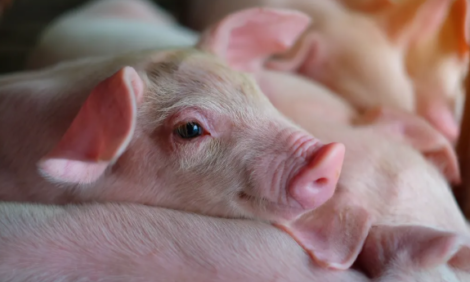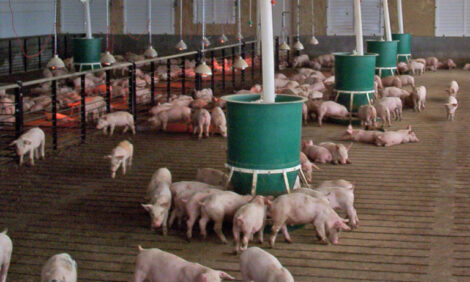



Challenge of Pigs Previously Immunised with Inactivated Vaccines Containing Homologous and Heterologous <em>Mycoplasma hyopneumoniae</em> Strains
All bacterins used evoked a serological response in the vaccinated animals and yet, after challenge with a highly virulent M. hyopneumoniae strain, there was no clear evidence of protection against clinical symptoms or lung lesions, according to University of Ghent researchers.Mycoplasma hyopneumoniae is the primary cause of enzootic pneumonia in pigs, write Iris Villarreal and colleagues at Ghent University in Belgium in a paper published recently in BMC Veterinary Research. Although vaccination is an important control tool, they continue, the results observed under field conditions are variable. This may be due to antigenic differences between the strains circulating in pig herds and the vaccine strain. This study compared the protective efficacy of four bacterins against challenge infection with a highly virulent field strain of M. hyopneumoniae.
Seventy eight, one-week-old piglets were randomly assigned to five treatment groups (A, B, C, D, E), 14 piglets each, and a negative control group (F) consisting of eight piglets.
All pigs were injected at one (D7) and four weeks of age (D28), with 2ml of either a placebo or a bacterin based on selected M. hyopneumoniae strains, namely A (F7.2C), B (F20.1L), C (B2V1W20 1A-F), D (J strain), E (placebo; positive control), F (placebo; negative control).
On day 56, all pigs except those of group F were challenged intratracheally with 7ml culture medium containing 107 CCU/ml of M. hyopneumoniae strain F7.2C. All pigs were euthanised and necropsied one day 84.
The severity of coughing and pneumonia lesions were the main parameters. Immunofluorescence (IF) testing, nested PCR testing of bronchoalveolar lavage (BAL) fluid and serology for M. hyopneumoniae were also performed.
The Merelbeke group found that the different bacterins only slightly improved clinical symptoms (average 0.38 in vaccinated groups versus 0.45 in group E) and histopathological lung lesions (average 3.20 in vaccinated groups versus 3.45 in group E) but did not improve macroscopic lung lesions (score 4.30 versus 4.03 in group E).
None of the vaccines was significantly and/or consistently better or worse than the other ones. All bacterins evoked a serological response in the vaccinated animals. All pigs, except those from group F, were positive with nPCR in BAL fluid at D84.
The researchers concluded that the bacterins did not induce a clear overall protection against challenge infection, and there were no significant differences in protective efficacy between bacterins containing homologous and heterologous M. hyopneumoniae strains.
They added that further research is necessary to better characterise the antigens involved in protection and to elucidate the protective immunity responses following M. hyopneumoniae vaccination and/or infection.
Reference
Villarreal I., K. Vranckx, D. Calus, F. Pasmans, F. Haesebrouck and D. Maes. 2012. Effect of challenge of pigs previously immunised with inactivated vaccines containing homologous and heterologous Mycoplasma hyopneumoniae strains. BMC Veterinary Research, 8:2. doi:10.1186/1746-6148-8-2
Further Reading
| - | You can view the full report by clicking here. |
Further Reading
| |
- | Find out more information on enzootic pneumonia by clicking here. |
February 2012








